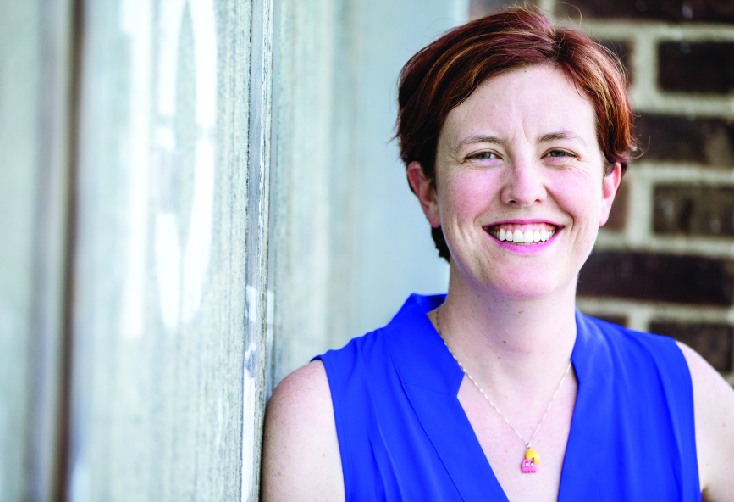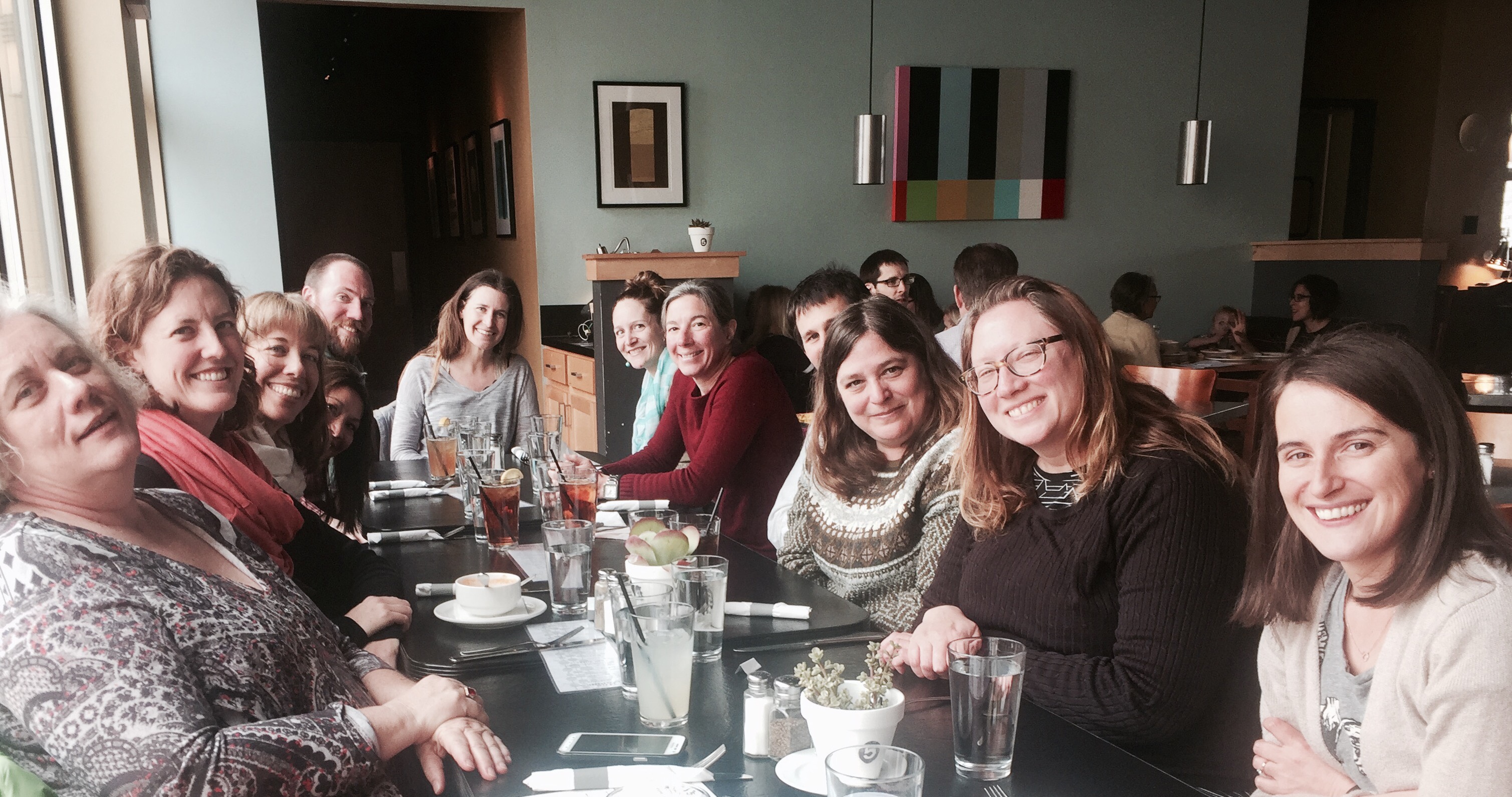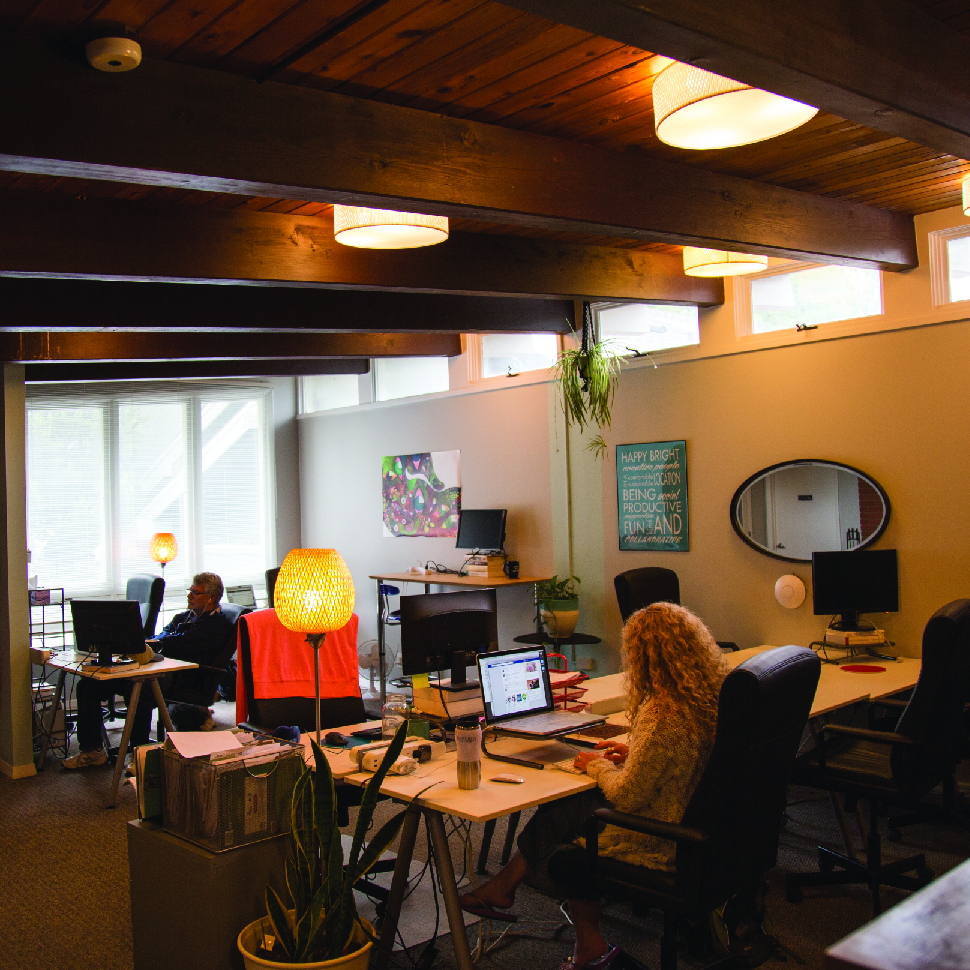Cohere is one of the original small-but-mighty coworking spaces. Located in Fort Collins, Colorado, the shared workspace has a strong focus on building connections and community.
Seven years in, Cohere is going strong and serves as a model for other small town coworking spaces.
I chatted with Angel Kwiatkowski, founder of Cohere and author of the Ultimate Coworking Launch Sequence about getting traction with a new space, connecting with potential members, and the best ways to educate an extended community about coworking.
Cat Johnson: When you opened Cohere, was it challenging to get momentum initially?
Angel Kwiatkowski: Yes. Nobody knew what coworking was. There were no articles about it, it was not in mainstream media at all.

What did you do to get the word out?
It took a layered approach of me attending events in the community that were already happening, introducing myself and letting them know what I was working on.
I did an Ignite presentation before we opened and that was a key turning point. It was an informational speech on coworking and what it is. At the end, I conveniently mentioned that I was opening a coworking space.
Then I had my own meetup group that was called Fort Collins Coworking, simple as that. Our first meeting was called, “What the Heck is Coworking?”. Six or seven people showed up and I just explained that there was this new thing called coworking, where independent people get together to work together instead of working alone. I asked them if they thought that would be neat in Fort Collins, and how we could make it be neat.
We got a donated area to cowork in once a week so we did practice coworking every Tuesday. The turning point was when people actually started doing it. They had fun and met a lot of people and went to lunch with a group.
It was a lot of word of mouth at the beginning. Then, once we had the space, we did a lot of events. We hosted a podcamp for podcasters and we did a free month of coworking.
I traded membership for the services I needed to open the business, so I had bodies in desks from day one. My graphic designer traded membership for my website and logo; I traded a membership for a press release. I had a couple of guys who worked remotely who were friends who joined right away. One of them had five coworkers who worked remotely for the same company and they all ended up joining. That was fun because they were actually coworkers but then used Cohere as a way to see each other in-person.
Did you know, from the start, that you were building a community, not just an office space?
I did. I found some videos Alex Hillman posted. He talked a lot about creating a platform for connection and the clubhouse mentality.
Part of it was also driven by me. The job I had before I started Cohere was in HR, but all I wanted to do was hang out with the graphic designers and the PR people and the web developers and the SEO lady and the industrial designers and the engineers. I was just so fascinated by what they were doing. That primed me.
One of the graphic designers at that company told me his girlfriend worked from home as a graphic designer and was going crazy. When I opened Cohere, I reached out to him and asked him to invite his girlfriend to the meetup I was doing. She was the first person who showed up at the first meetup. She was so excited. We were both early and we had no idea what we were doing. We sat down, we turned our computers on, then we looked at each other and said, “Now what?” We ended up just talking for an hour about who we are, where we were from, what we were working on. It’s just repeating that 100,000 times.
I see a lot of new coworking space operators trying to figure out how to fill the space they’ve already opened. The big protip is to start building your community before you open the doors to a new space. What other tips can you offer them?
Craigslist works really well on a multi-tiered approach. If you’re hosting events in your space, put those on the community tab so people see them there. Put your flexdesk or other memberships in the commercial real estate section.
Usually, when people work from home and are feeling lonely, their instinct is to rent an office. If they come across your listing on Craigslist explaining that what they need isn’t an office but friends, then they’re primed for it and will find your website. If you’ve got a free daypass or a tour that’s easy to sign up for, they’re primed for interaction.
“Craigslist works really well on a multi-tiered approach.”
I’ve also had some success with Reddit on our Fort Collins subReddit. I watch for threads about people asking about coworking or asking where people are working from. Somebody asked what the best coffee shop to work from was. That’s a great place to say, “Actually, a coffee shop is not the best place to work.” I had members get on there before I did and tell them that they should join Cohere and explain why it’s better than a coffee shop. Having the members tell the story is always way more effective than having the owner tell the story.
Has your community outreach and marketing changed over the years?

A lot. We had a weekly blog post we published for the first four years. The posts were a lot of tips, tricks and techniques for remote workers, informational and educational posts about coworking, stuff that was going on in Fort Collins, like Maker Faires and a Freelance Camp we put on.
Because we were publishing all these blog posts, we kind of owned, and still do own, the SEO for coworking and shared office. We rely a lot on that now.
Now with Focoworks, our Fort Collins coworking alliance, we’re getting more traffic to that clearinghouse website so people can see all the different choices that are available to them. We give more autonomy to the people who are searching so they find everyone all at once, instead of just finding one and joining the only one they find. That way they can see all of them and tour all of them.
The only thing I advertise now is when I have a private office. I have a general Craigslist posting I put up sometimes if I need a few flexdeskers, but we’re so often very full so I’m not very aggressive with my advertising or I just end up turning people away.
From the inside, it seems like coworking and the shared office industry is growing so fast that everyone must know about it. But, I meet people daily who are like, “What is this coworking thing you’re always talking about?” How do you educate your extended community about what it is you’re doing?
I usually ask them questions to find out their pain point. The phrase I hear a lot is, “I’ve been working at home for x amount of time and I’m going crazy.” Then, I can share a story from one of our members. I’ll say, “Oh yeah, Julie over here just joined. She had been working at home for three years and she was also going crazy. Now she comes one day a week to talk to other people, and she’s made friends, and they go to lunch together.” Or they might say, “I have a newborn at home,” and I’ll say, “I know what you mean. When I had a newborn, I couldn’t get anything done from home, I had to go to the office to be productive.”
It’s just drawing a really clear parallel and saying, “I hear your experience, we understand your experience, and here’s a real person coworking helped who was in your exact situation.”
Fort Collins is a pretty small town. What challenges do you face that urban coworking spaces may not?
One of our main challenges is that 80-90 percent of our coworking spaces are located within five blocks of each other. We can’t use location as a marketing tool, because we’re all clustered. It’s good and bad because if you remove location as the tool, then we really have to make our communities shine to differentiate them from each other.
“We can’t use location as a marketing tool, because we’re all clustered.”
One space is really heavy on photographers and videographers. They have a giant warehouse they’ve turned into a video shoot studio. Cohere’s secret sauce is the friendship-based aspect. We’ll serve everyone, but our primary goal is to help you make friends. It’s so hard to make friends when you don’t go to a job every day.
What advice would you offer someone thinking of opening a space in a small town?
My first piece of advice is to see if any communities already exist that are starting coworking and if maybe you would just like to join one rather than starting your own.
I would also ask that person to work from a coffee shop all day and keep a ledger of how that experience was for them and how much money they spent. Those notes will guide future decisions they make about pricing and marketing and solving people’s pain points.
Anything you’d like to add? What else should I know?
When you’re starting a coworking space in a small town, you’re probably going to have a small coworking space. Wrap your head around the fact that you will be doing everything. Embrace the fact that you’re the person who greets everyone, and orders the coffee, and vacuums the floor, and takes out the trash, and unclogs the toilet. Come at that in service to your community rather than resenting the earthly tasks that will consume much of your time.
“Wrap your head around the fact that you will be doing everything.”
Know that the more effort you put into those things, there’s a light at the end of the tunnel. One day you’ll be able to hire people and engage your community to help you complete those tasks. The tipping point is when you figure out a way to get your community to start doing those things in service of each other rather than you doing everything for everyone. That’s a magical place to be.



 Dr. Gleb Tsipursky – The Office Whisperer
Dr. Gleb Tsipursky – The Office Whisperer Nirit Cohen – WorkFutures
Nirit Cohen – WorkFutures Angela Howard – Culture Expert
Angela Howard – Culture Expert Drew Jones – Design & Innovation
Drew Jones – Design & Innovation Jonathan Price – CRE & Flex Expert
Jonathan Price – CRE & Flex Expert












